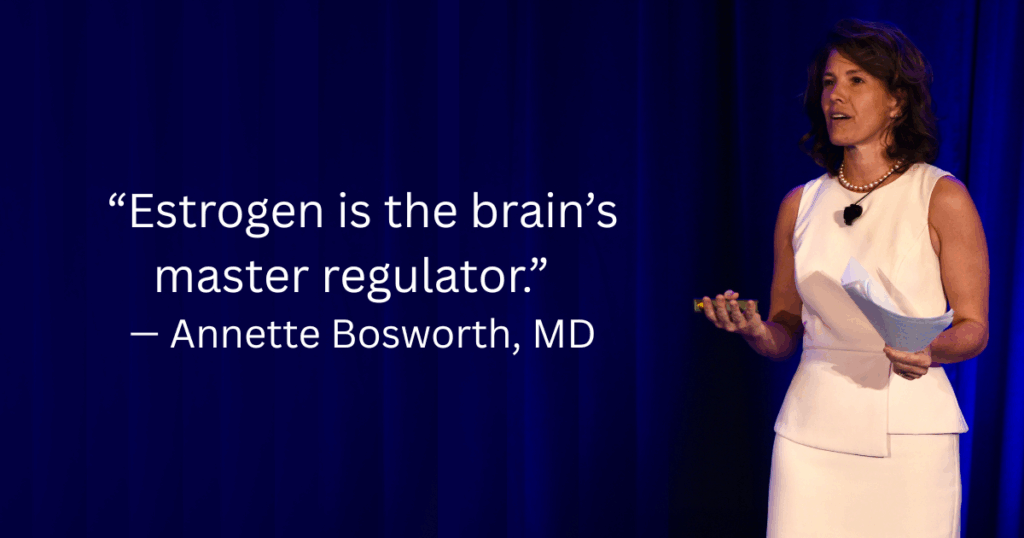Dr. Annette “Dr. Boz” Bosworth’s deep dive into estrogen, menopause, and the brain was one of the most talked-about presentations at the 10th Annual San Diego Symposium for Metabolic Health in August. Her session blended history, neuroscience, and clinical insight to give attendees a clearer understanding of a topic that’s often misunderstood or ignored.
“Thank you for attending a lecture that has the word menopause in the title, because it’s long overdue,” Dr. Boz began. That opening set the tone for a refreshingly direct and data-driven exploration of how estrogen influences not just reproduction but also cognition, mood, and brain aging—and how decades of confusion have left millions of women without the information they need.
How the conversation went off the rails
Dr. Boz explained that the modern confusion around hormone therapy stems largely from the 2003 WHI trial. “There was a hijacking of the discussion around the word menopause… that WHI trial stopped the way we were talking about estrogen before, and it led to 22 years later that a generation of women have been denied the opportunity to talk about estrogen and the brain.”
That confusion, she said, continues to ripple across generations. “A generation of young women … don’t know what the word menopause is.”
She reminded the audience that the fear linking estrogen to breast cancer is not supported by the totality of evidence. Quoting from Estrogen Matters, she noted: “We have plenty of resources that show what happens to breast cancer survivors when they take hormone replacement therapy… when you’re just looking at recurrence of cancer, don’t think there’s not data.”
Estrogen as the brain’s “master regulator”
Dr. Boz walked the audience through 90 years of neuroscience—from the first identification of sex hormones in the 1930s to Lisa Mosconi’s groundbreaking 2024 PET-scan images showing estrogen receptor density in the human brain.

“For the first time,” she said, “a woman’s brain was identified by looking at the estrogen receptor density through a PET scan … in 2024 for the first time.”
That discovery confirmed what animal research had hinted at for decades: estrogen receptors remain active well into a woman’s 60s, particularly in brain regions responsible for memory and emotion such as the hippocampus, hypothalamus, and amygdala.
Her key takeaway was simple but powerful: “The punch line … is that estrogen is the brain’s master regulator.” It influences neuroplasticity, communication between neurons, and the ability to maintain cognitive resilience through midlife and beyond.
Why metabolic health comes first
Dr. Boz emphasized that effective hormone therapy starts with reversing insulin resistance. “You’re not on a ketogenic diet if you’re not making ketones in the morning,” she told attendees. Her rule of thumb: morning ketones above 0.5 mmol/L and steady blood-glucose recovery within two hours after meals.
“If I give you that lovely estrogen, I don’t care what dose—insulin will rule it,” she said. “I can give you this prescription … but it’s not going to do what you want it to do unless you help me.”
Once metabolic health improves, her preferred delivery method is simple and affordable: micronized estradiol taken under the tongue. This sublingual approach bypasses the liver and avoids the metabolic complications associated with oral tablets. “It’s easy, cheap, and skips first-pass metabolism,” she explained—allowing for precise, patient-controlled dosing.
The Sardine Challenge: Restoring satiety and metabolic flexibility
To help insulin-resistant patients break through plateaus, Dr. Boz uses what she calls the “sardine challenge.” For 72 hours, participants eat only sardines, salt, and water (or a little mustard). The goal is to quiet hunger signals and accelerate ketosis.
“By the third can,” she said with a grin, “most people realize they’re not actually hungry.” Morning ketones soar and blood glucose stabilizes—often more effectively than during a traditional water fast.
“After the sardine challenge,” she said, “the best numbers are the day after … and it really teaches what satiety feels like.”
Her practical summary: the sardine challenge isn’t about sardines—it’s about metabolic reset and clarity of mind. “They really have the first conversation that says, ‘Huh, my brain is less noisy.’ ”
The deeper message
As she closed, Dr. Boz reminded the audience that her real mission isn’t just teaching dietary tricks—it’s restoring metabolic and cognitive health in a generation that’s been misled.
“I teach the ketogenic diet the way I would teach it to a seizure patient or someone with cancer,” she said, emphasizing that the goal is measurable brain repair, not fad nutrition. “You have to lower the insulin. My estrogen can’t get where it’s going without that.”
“It would have taken me four years of one-on-one visits to get the kind of outcomes we get in three weeks.” Her commitment to education—and to empowering both physicians and patients—is exactly why we’re so excited to welcome her back to the stage in BOCA.
If you’d like the video recording of Dr. Bosworth’s San Diego presentation (and all the others), they’re still available for purchase—optional CME credits are also available.

